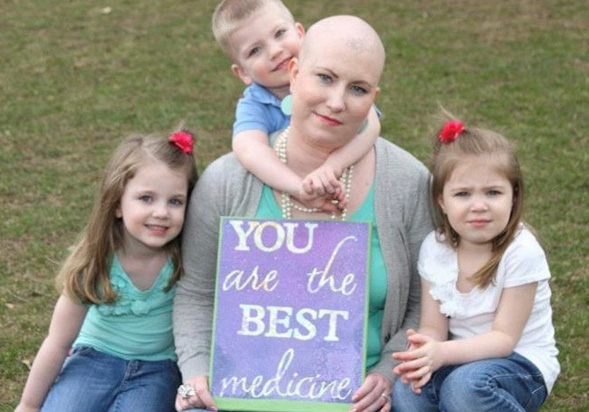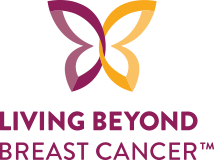Parenting With Metastatic Breast Cancer: Young Kids (Part One)
By Kate


I have a video from the day I received the news that I had metastatic breast cancer.
My then four-year-old was on the iPad and decided to record a moment of her dad and me hugging. She didn't know what had just happened. She just knew Mom was sad and crying, and Dad was comforting her.
"Group hug for Mommy!" my husband yelled as her twin sister and little brother came trotting over.
"Come on, Lily,” I can be seen saying with tear-stained cheeks. “Group hug."
One thing I vividly remember about that day was my immediate thoughts after being told I had cancer: my kids.
I didn't have an easy road to motherhood. It was filled with obstacles, sadness, death, and heartache. My first daughter passed away at 3 days old, and six months later I had a miscarriage in my second trimester. A few years later, my twin girls were born premature and then a year later my son and I nearly died during childbirth – but I wanted nothing more than to be a mom.
My son ended up with several birth defects and complications which would result in him needing special care his first few years. Because of this, I was unable to work. Most of our days were spent at therapies and appointments for him. When we were not there, you could find us on the floor playing or building a fort. I made sure our days were full of fun activities to do, places to explore and fun to be had.
Although financially things were not always easy, our house was filled with love and laughter. The family that I always dreamed of having was being threatened by my diagnosis. Every waking minute of my life was dedicated to my children who were only 4, 4, and almost 3. Questions swirled in my mind every waking second. Now what happens? What do I do? How will my family handle me being sick? How can I be a mom and a cancer patient? How do I tell my kids about cancer?
Talking to your young children about a cancer diagnosis is a very personal decision. I wanted to explain to my kids that our lives would look much different. I would not always be able to get on the ground and play with them, we wouldn't be able to go on as many adventures. I would sleep much more. I would be sick. I would have surgeries and be in the hospital. My appearance was going to change, and I might lose my hair. All these things would become our “new normal.”
My children's whole young lives have been intricately woven into a cancer web. There are many things I have done along the way that I feel can be helpful to other parents. Here are my top tips for talking to young children about cancer.
- Be Honest: Life is going to change. Your kids will pick up on that. When talking to your kids, explain it on their level. I found some great books that helped me explain this to them. Many are out there, but make sure they are age-appropriate for your kids' ages.
- Explain Your Changing Appearance: Young children may not understand much about cancer, but they will know something is different if your appearance starts to change from treatment. My little ones were devastated by the loss of my hair. The day I chose to shave it completely, we had a little party. My aunt bought each of them a doll with no hair and then they helped shave my head, followed by some cake. I also talked with them about my port. The port stuck out of my chest and was visible to them. The first year, the area was very tender, so chest cuddles couldn't happen as much. I told them I was like a robot! Later, I allowed them to come to the cancer center and while they were not allowed into the treatment room, I came out to sit with them when I could. I tried my best to explain what everything was and how getting my medicine worked.
- Make a “Treasure Bin”: I knew there would be days when I would not be able to move out of bed or from the bathroom. As a stay-at-home mom, I needed to be able to have things for them to do. I decided to ask family and friends for some inexpensive toys, crafts, and games that didn't need supervision. In no time, our treasure bin was filled! On days when I was sick, I would allow the kids to go into our treasure bin and each pick one or two things out. This always gave me a few hours to focus on myself. The kids loved the excitement that came along with getting a new toy, activity, or game! I could sit with them as they painted or played with clay. I even made these for a few other moms with young kids.
- Enlist Help: I know how hard asking for help is but do your best to ask in any way you can. Create a food, cleaning, ride, or babysitting schedule (there are many online platforms you can find). Let people help clean your home and drop off meals. Having a tribe to help me during all stages of my kid’s young lives was essential to me focusing on my treatment.
- Talk to the School Counselor or Teacher: It can be so hard for little kids to get out big emotions, and sometimes that manifests in behavior. Once my children were school aged, I found that they became quite attached to their teachers. If something was going on with me, they became clingier and more emotional at school. Keeping their schools in the loop with what was going on at home allowed my children to have a safe space while they were there. This also allowed the school keep a closer eye out for changes in behavior or their grades. This helped make sure that my kids were emotionally and academically on track. When they needed some extra help, the school enlisted an outside therapy agency to come in and talk through some of those big emotions.
- Start a "Mommy Bucket List": When you're diagnosed with mBC, you are on borrowed time. I felt like I had a new lens on life and didn't want it to pass me by. I chose to celebrate each milestone, no matter how small, by creating a "Mommy Bucket List". It was filled with activities I wanted to do with them or see them accomplish no matter how big or small. From learning small things like how to read or write to big things like going on vacation! As the kids got older, the list grew to include things like riding bikes or playing an instrument. Having this list allowed us to not only make memories together, but to have activities to look forward to. The kids loved the Mommy Bucket List so much that we even created Summer and Fall Bucket Lists!
- Find Nonprofits Dedicated to Memory Making: There are a lot of great nonprofits out there whose sole mission is to help parents with terminal cancer make memories or go on respite vacations. These nonprofits are near and dear to our hearts because they have given us some of our greatest adventures.
- Find Other Moms With mBC: I have found many of my greatest cancer friends on social media. We have created a network of other moms with littles and often share our struggles. There are usually local support groups from your hospital you can attend and even local nonprofits that you can connect with. If not, you can find many virtual support groups online. Being able to talk through having young kids while in treatment was such a relief. Some of the greatest words in the English Language are "I know how you feel". Knowing I wasn't alone helped me to keep being the best mom I could be.










